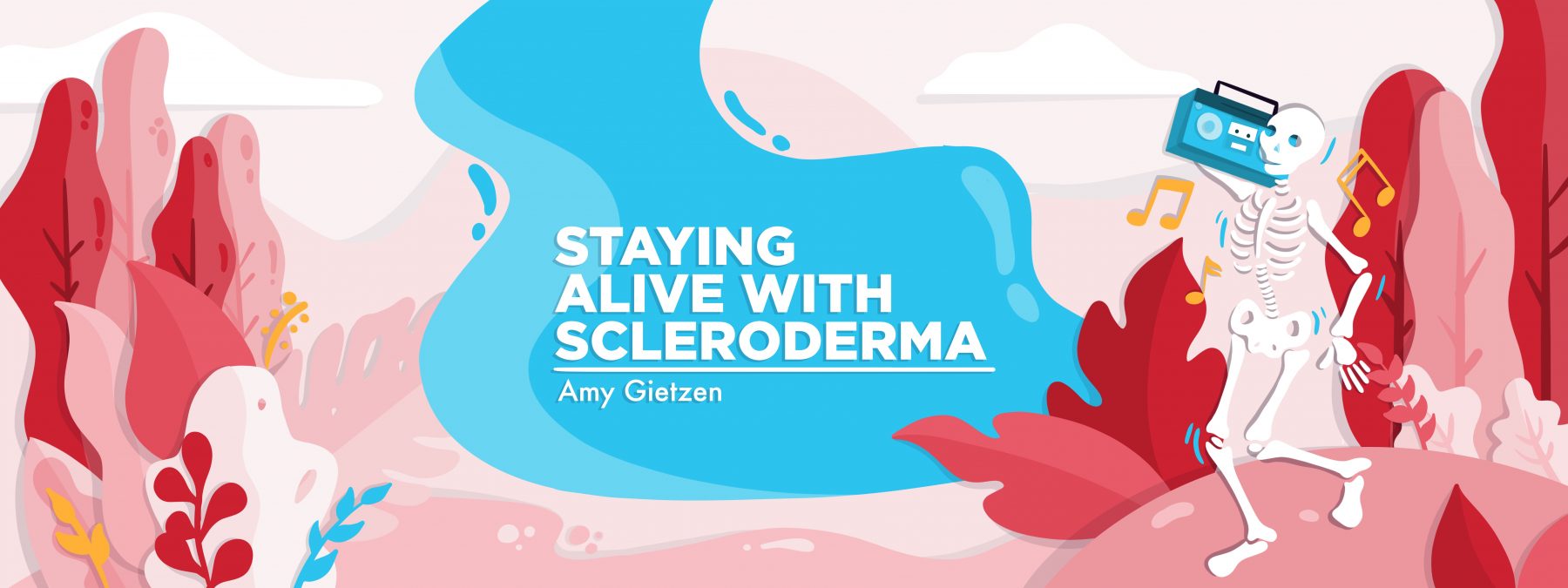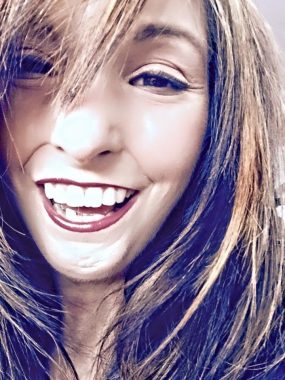Scleroderma Offered Me a Path to Self-acceptance
Written by |

We all face a lot of pressure to appear perfect — educated, attractive, healthy, capable, and independent. This can be a big pair of shoes for a “normal,” healthy person to fill. Now imagine how difficult it is for someone with a chronic, debilitating illness to check all of those boxes.
Living with a rare disease like scleroderma can affect the way we see and interact with the world, and the way we look at ourselves.
Growing pains
I struggled with my appearance when I was a teenager. I was an overweight child and stayed that way until I was a freshman in high school. I was incessantly teased for my weight and my appearance, and learning to accept how I looked wasn’t easy. As I grew out of my childhood awkwardness and began to become a young woman, I started to come into my own.
I wasn’t completely in love with my appearance, though — nobody is — but when I learned at the age of 19 that I had an illness that would gradually reconstruct my entire body inside and out, I was devastated.
Ch-ch-ch-changes
After I was diagnosed, I started to notice significant changes in my appearance. My lips got a lot thinner, and my skin became tight, shiny, and hard. Red blotches, called telangiectasias, began to appear, first on my face and neck, and eventually spreading to my chest, arms, and legs. My entire body looked like a connect-the-dots puzzle. Within a year of my diagnosis, I looked like a completely different person. Looking in the mirror was shocking, and sometimes I ran into classmates who didn’t even recognize me.
I felt like I was less than myself, which overwhelmed me. Self-acceptance took a long time. Being able to say “I love myself” and “I am comfortable in my own skin” didn’t happen overnight.

Amy Gietzen is loving herself, even if she isn’t happy with her appearance. (Photo by Amy Gietzen)

Amy makes a funny face in this selfie to show how she can laugh at herself. (Photo by Amy Gietzen)
Mapping a path to self-acceptance
Today, I know how to deal with difficult situations better than I did years ago. So, how did I do it?
I had to find my inner strength, learn to dig deep within myself, and know that I was worth something. I was beautiful, no matter what my face, skin, or fingers looked like.
But that took time. I didn’t just wake up one day and fall in love with my changing body. But I refused to allow my illness to stop me from living my life the way I wanted to live it. Yes, I still have setbacks — about the way I used to look, about clothing I used to be able to wear, about experiences I can no longer enjoy. But having this disease has helped me grow and learn to accept not only my disabilities, but others’ disabilities as well.
Embracing ourselves warts, and all
I’ve always known my time on earth was limited. After my diagnosis, I began to realize that any moment could be my last. Wasting precious time feeling sorry for myself was not how I wanted to live. I wanted to enjoy trying new things and to be around people I loved. I wanted to linger in the quiet spaces and take advantage of the beauty that was around me.
I suspect that too few people are living their lives to the fullest. We can get so caught up in superficial and artificial things and end up missing out on the most important things that life has to offer.
Why is it that so many of us can’t give ourselves a pass when it comes to society’s expectations? Why is it so important for us to “look the part” and fit into the mold of whom we think we are expected to be and how we are to act?
We only get one go around in life, and we can’t take anything back. We don’t get a redo. So, we should allow ourselves the time to live, breathe in the crisp winter air, feel the hot sun on our faces, run our fingers through the sand, and dance in the rain. We should give ourselves permission to experience life as if each day were our last. It will change how we see the world.
We can make love, peace, beauty, and kindness the new norm. We definitely can use a little more of that in the world, don’t you think?
Do you agree? Please share your thoughts in the comments below.
***
Note: Scleroderma News is strictly a news and information website about the disease. It does not provide medical advice, diagnosis, or treatment. This content is not intended to be a substitute for professional medical advice, diagnosis, or treatment. Always seek the advice of your physician or other qualified health provider with any questions you may have regarding a medical condition. Never disregard professional medical advice or delay in seeking it because of something you have read on this website. The opinions expressed in this column are not those of Scleroderma News or its parent company, Bionews, and are intended to spark discussion about issues pertaining to scleroderma.







JULIE A KOLANKOWSKI KOLANKOWSKI
the hardest thing is living with a disease that can kill you but i do not look at that way i look at that there is hope they can find a cure. meds to treat the symptoms there is diet, exercise, art work every day but what i found stanford has shown a lot of ignorance about this disease they treated me like i was crazy and i decided no thanks.
i found a great team who believes me and each day counts. i see my birds on my walks, do my tai chi, try herbal remedies for pain because my pain level is high none of the meds work. i did not have family help at all so i walked away went it alone.
the best thing to learn is compassion for yourself. if your sick stay in bed rest, movies, ice cream, looking for support groups, friends who help and who listen yes my appearance has changed but its not stopping me i really do not care what they think. this is my life iam about to get my housing voucher and move into a new place and what i want to do make it a nest a place of warmth and place of rest and decorate with bright colors. what i am not doing any more is listening to people who do not support me like stanford. they could help so many but remain ignorant make you feel alone and scared that is terrifying to a person with this disease. we need love, understanding, support its our only line of survival for beating this disease. I do not like being alone. for us there is a light at the end of the tunnel our voice speak out loud and clear now we are being heard you can not hide your head in shame any more we all learn to walk tall we are a family who love and respect each other from that we get strength, hope, wisdom and love. i love all of you so much thank for being my support in the dark.
Tom Mancini
72 y/o male. Yep, one of the rare ones. 6 yrs systemic scleroderma. Interstitial lung disease, chronic kidney disease, reynauds, crest, teleconnectthedots all over. Can’t breathe now w/o supplemental O2 and am very limited in what I can do on my own. It’s hard to STAY positive, but am so very very lucky to have a wonderful wife partner caregiver to keep me going. The negativity is fueled by the guilt that due to my decline, her life will ever be the same nor even close to what we envisioned our retirement to be. In spite of this curse, I am very thankful of the wonderful children we raised together and the amazing grandchildren! Thanks for your column every week.
Amy Gietzen
Tom,
I appreciate you sharing your journey with me! Thank you and I am humbled by your gracious words.
Marcia Haaseth
Hi Amy
Can i ask you how you get your family to understand with crippled hands things are hard to do? Also, how can you make them understand Stress is the worst thing? I have tried but they keep doing it. Do you have tricks on how to do things easier with these crippled hands? I'm so over trying to make my other half understand I'm thinking being alone will be better, I have my daughters and grandkids. Just so unhappy
thanks
marcia
Amy Gietzen
Hi Marcia
I think sometimes you just have to take people for who they are with that being said I am so sorry you are feeling like your feelings aren't validated! I suggest speaking to someone, therapist, doctor, councilor? someone whom you can share your frustrations with.
Aruna Dayaram
Good day.
Thats the way be positive.
I have also been diagnosed with limited scleroderma. I was really scared. My body had changed in colour, black spots. My index finger has been amputated. Everyday i get up for work with a positive feeling that I will be fine.
Regards
Aruna
Marcia Haaseth
Thanks Amy for listening to me:)